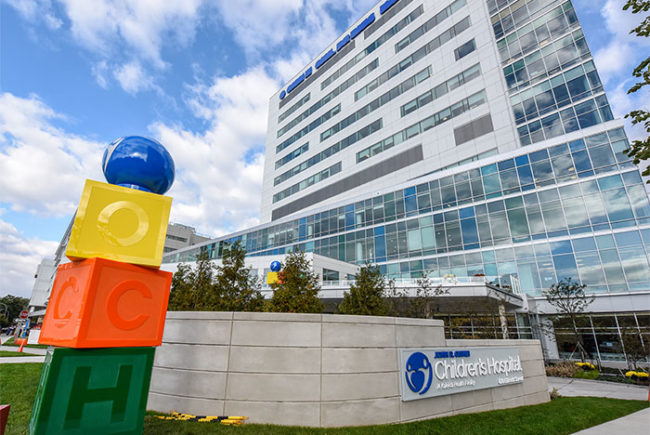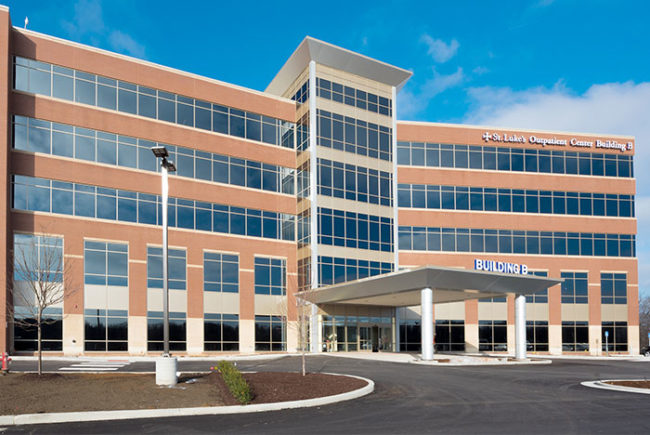MetroHealth, Cleveland, has opened a new 100,000-square-foot vertical expansion of an existing critical care pavilion enabling the system to deliver high-level intensive care that includes a regional Ebola treatment center.
The expansion includes two intensive care unit (ICU) floors that include 85 new private patient rooms, a mechanical floor built above an active emergency department, a Level I trauma center and a surgical department.
The exterior, designed by CBLH Design Inc., is an extension of the existing structure and sets the tone for future campus development. The interiors, designed by CannonDesign, integrate evidence-based design strategies and flexibility throughout.
The expansion also includes a federally funded regional Ebola treatment center to provide care for Ebola patients from the region and for other patients with highly infectious diseases.
The design team focused on making the rooms in the treatment center as similar to the other 85 patient rooms on the two ICU floors. The special disease care unit also required special design treatment, which was drawn from CDC guidance and lessons learned at U.S. sites where Ebola patients had been treated.
For example, CannonDesign utilized MetroHealth’s simulation laboratory to work out design details required for the donning and doffing procedures required to keep the medical staff safe in the treatment center.
The treatment center includes two patient rooms, each with a dedicated exit room, that provides certain areas (marked on the floor by color) to remove the protective equipment and go from a “hot zone,” or contaminated area, to a “cold zone,” or noncontaminated space.
“It’s been extremely rewarding to work with MetroHealth on this project that truly strengthens their ability to deliver high-quality critical care to patients who need it in Cleveland and from across the country,” says Jocelyn Stroupe, principal and director of CannonDesign’s healthcare interiors practice.
“MetroHealth’s commitment to patient care and patient experience has never wavered during this project and that commitment shines through in the new facility,” she says.
MetroHealth’s decision to expand the critical care pavilion stemmed from an assessment of its entire infrastructure, which revealed the need for numerous significant upgrades. When the polar vortex hit Cleveland in 2014, the vulnerability of these systems became even more apparent, causing the health system to strengthen the pavilion. This project is the first of several that will encompass a complete transformation of the MetroHealth campus.
“Collaboration was a key element to the success of this project,” says Adam O’Brien, director of design and the vertical expansion’s project manager, CBLH. “We had the opportunity to work hand-in-hand with key stakeholders to create a highly technical, yet very personal and comforting space for patients and caregivers alike.”
Every space within the expansion is informed by feedback from stakeholders. For example, when designing the patient rooms, fully functional mock-ups were assembled for hospital officials, patients and family members to experience. The goal was to achieve a space that accommodated family, created a calming environment and allowed for flexibility.
The design of the patient rooms was an iterative process, and stakeholder feedback led to the final result. The rooms are standardized, acuity-adaptable, same-handed and include a family zone, floor-to-ceiling windows, nature-inspired imagery and the ability to house two patients per room in an emergency.
Decentralized nurse stations provide caregivers an up-close yet non-obtrusive opportunity to monitor patients. As the first unit to be built under the transformation plan, the patient room design will become the new standard across the campus.
MetroHealth is an integrated health system with an acute care hospital, a skilled nursing facility and 20 other health care locations throughout Cleveland and Ohio.
In other health care facility news:
-
Skanska USA, New York City, has signed a $42 million contract with the University of Virginia Health System to renovate and expand University of Virginia Hospital in Charlottesville.
The contract consists of early site work, utility relocations and installation of the building foundation system. The entire multiphase hospital expansion and renovation project is slated for completion in December 2020.
Construction services began in June 2015 and this phase of the project is expected to be completed in September 2017.
-
CBRE Healthcare was selected to provide project management and related consulting services for Johns Hopkins All Children’s Hospital's new 230,000-square-foot research and education building.
Johns Hopkins All Children’s recently acquired approximately 1.4 acres of land neighboring its St. Petersburg campus. This land is near both the new hospital and the outpatient care center and will house the new research and educational building.
Designed to serve as an educational center for pediatric resident physicians and fellows, the new facility will offer a simulation lab for clinical teaching and collaborative environments for research. The new $95.5 million project began construction earlier this year with completion projected in mid-2018.
Want to see your new health care construction project featured on HFM Daily? Email project information and photos to Senior Editor Jeff Ferenc or tweet to him @JeffFerenc.






